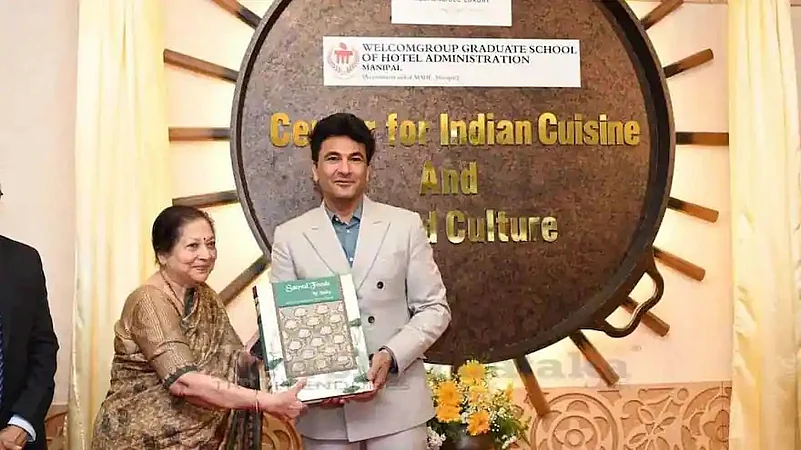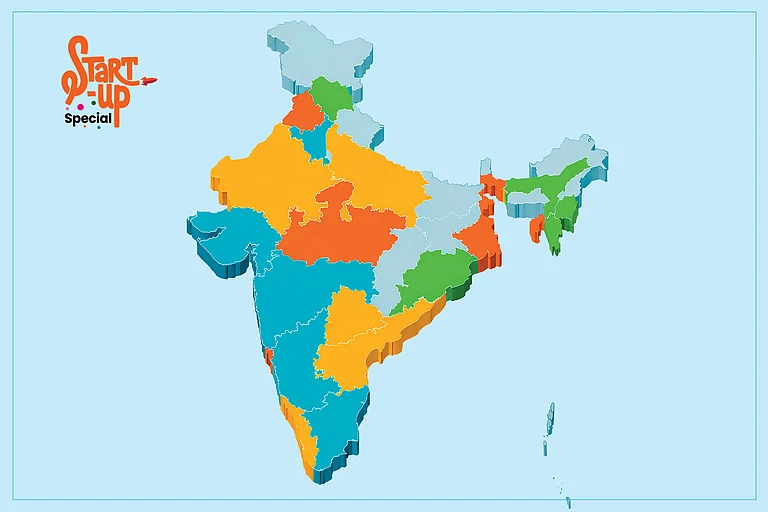Restaurateur, author, TV host and award-winning chef Vikas Khanna knows how deeply the wounds of racial profiling get etched on one's soul. He has several such memories cached away in his mind.
A young Khanna was eager to showcase his cooking chops while working for a Michelin-star chef at a Parisian restaurant 15 years ago. During his lunch break, he cooked a dish and requested his colleague to present it to the executive chef. He was heartbroken when the chef refused to touch it, stating that the only jobs that dark-skinned people would get in Paris restaurants were to clean it, do the deliveries, or manage the stores.
Today, having won the coveted Michelin star for six consecutive years since 2011, Khanna does not want the next generation of chefs emerging from India to face similar racial bias. In October 2023, he inaugurated the Centre for Indian Cuisine and Food Culture (CICFC) at his alma mater, Welcomgroup Graduate School of Hotel Administration (WGSHA), under the Manipal Academy of Higher Education (MAHE).
Chef K Thirugnanasambantham, Principal of WGSHA, said that the centre's objective goes beyond merely enhancing the global recognition of Indian cuisine. "It aims to encourage students to move beyond conventional perceptions of Indian culinary practices and delve into macro- and micro-cuisines within the country," he claimed while emphasising the profound connection between Indian food, history, and culture.
CICFC focuses on educating the youth about the extensive historical roots of Indian cuisine, tracing its evolution across centuries. Additionally, it aims to explore the scientific aspects behind utilising fresh farm produce and the artistry involved in Indian cooking. Chef K Thirugnanasambantham drew parallels with ITC Hotels, emphasising that, like these establishments, the centre will engage in R&D to create new recipes and contribute to the expanding knowledge base of Indian gastronomy.
An MAHE alumnus himself, Khanna graduated in hotel management in 1991 and later headed to New York to hone his skills at the Culinary Institute of America. Talking on the sidelines of his pop-up at Mumbai's Ditas, he announced, "India's next Michelin star chef will come from CICFC."
His conviction is based on the financial outlay of the institute—he stated that the institute is worth Rs 40 crore and close to $4 million was spent just on the food museum! While some might question the necessity of this lavish investment, he says it was required to break the perception that budding hoteliers and chefs should look towards western shores for inspiration.
His conviction is borne out by the culinary preparations of Mohammed Aashiq, the 24-year-old from Mangalore, who won MasterChef India 2023, where Khanna is one of the judges. He was floored by Aashiq's 'Crispy Paradise' and his attempt to present local Mangalorean dishes in a global way.
These efforts also struck a chord because they echo Khanna's ethos at his restaurants. In 2009, he inaugurated the high-end restaurant Junoon in New York City, which reportedly has a three-month waiting list for table reservations. Expanding his culinary ventures, in 2019, he introduced Kinara by Vikas Khanna in Dubai and was encouraged by the positive response. A year later, he also unveiled Ellora in the same city.
The common thread binding all these restaurants is that they present a contemporary twist on traditional Indian cuisine. In fact, he bagged the Michelin star for Junoon for the 'Rendered Duck with Tellicherry Peppercorns'; a dish that he later recreated for many American TV shows. The judges were amazed how he could whip up a dish that had so many complex flavours but felt comforting and looked 'like a wow'.
When they questioned whether this was a futuristic preparation, Khanna told them it was a pre-colonisation one when peppercorns were the only spice known in Southern India. The dish comprised just four ingredients besides the duck: peppercorns, tamarind, coconut milk, and curry leaves.
He maintained that India has a smorgasbord of dishes to offer the world, which unfortunately equates it with naan, butter chicken and dal. This is why he claims that Aashiq's ghee roast sauce and his curry leaf oil in the Masterchef India 2023 is the kind of Indian food that the world needs to be introduced to. "My co-judge, Chef Ranveer Singh, pointed out that during the last 14 years of this show, we must have tasted over 1 lakh dishes. But the way Aashiq delivered his food and the honesty it reflected touched my heart," he said while getting emotional.
This reiterates his belief India's next culinary superstar will come from CICFC. He also believes the institute will help bridge the debilitating talent crunch the hospitality sector is witnessing.
The findings from the survey titled 'Hospitality from the Lens of Human Resource,' conducted by The People Network, reveal that approximately 61 per cent of HR leaders surveyed expressed the view that compensation in the hospitality industry has lagged behind that of other service sectors. The survey also highlighted a notable concern with the highest attrition rate at the frontline level, reaching 48 per cent.
He recalled that when he started his professional journey with the Taj Delhi in 1991, he did not have the privilege of learning Indian cuisine. He was often told that if he wanted to work as an executive chef in a 5-star restaurant, he had to learn to cook international cuisines.
"We used to have a wall with the photos of 21 Michelin Star chefs, and I would wonder why no Indian was there in it," he rued. Today, seven other Indian chefs have vaulted this glass boundary, including this Masterchef co-judge Garima Arora, Vineet Bhatia, Atul Kochhar, Sriram Aylur, Alfred Prasad, Srijith Gopinathan and the late Floyd Cardoz.
The answer lies in introducing more institutes like the newly opened CICFC at MAHE that will encourage youngsters to enter the industry. These can teach the budding talent to prepare Indian dishes for a global clientele, which he maintained is missing in the country's hospitality landscape.































